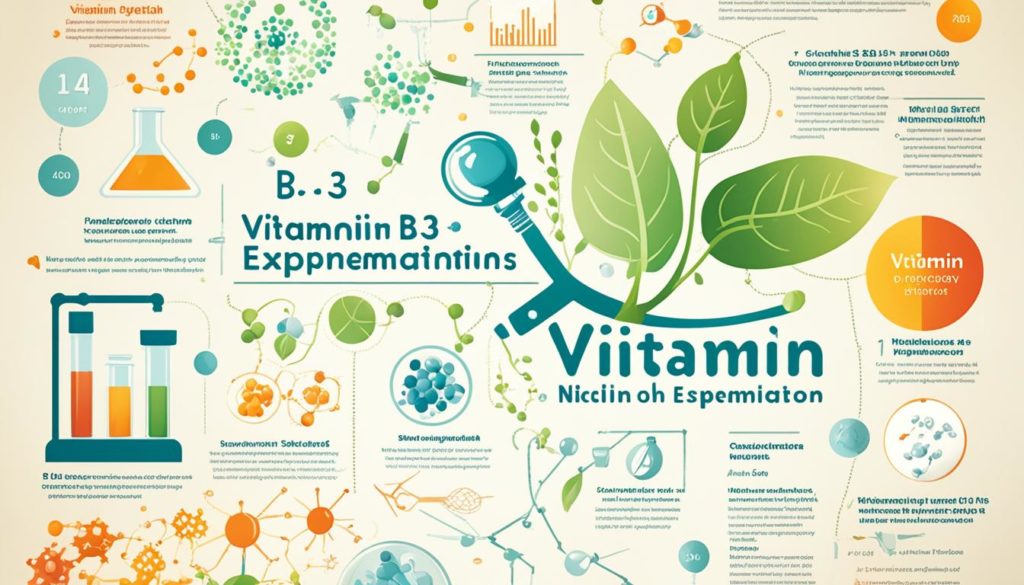Vitamin B3, also known as niacin, is a key nutrient for good health. It’s important for many body functions, like making energy and fixing DNA. We’ll look at how Vitamin B3 helps keep you healthy.
Vitamin B3 plays a big role in metabolism, skin health, and brain function. Knowing about niacin’s benefits can help you choose the right foods or supplements. It’s a key part of staying well.
For more on essential nutrients and health, check out this guide.
Key Takeaways
- Vitamin B3, also called niacin, is vital for overall wellness.
- It’s key for energy production and DNA repair among other functions.
- Niacin helps with metabolism and brain function.
- Knowing about niacin can help with nutrition choices.
- You can get it from food or supplements.
What is Vitamin B3 (Niacin)?
Vitamin B3, also known as niacin, is a key nutrient. Its story goes back centuries and is tied to the growth of nutrition science. This part looks at niacin’s history and types, showing why they’re important for us.
History and Discovery
The *history of niacin* is fascinating and changed the game. By the early 1900s, we learned a lot about essential nutrients with the discovery of Vitamin B3. Pellegra, a disease from not having enough niacin, pushed scientists like Dr. Joseph Goldberger to dig deeper.
His work in the 1920s was huge in showing us how niacin keeps us healthy. Finding out how important niacin is was a big step in understanding vitamins. This led to making supplements and foods with more nutrients, helping many people stay healthy.

Types of Vitamin B3
Knowing about *niacin types* helps us see how it helps us. There are mainly two kinds:
- Nicotinic Acid: This type is known for lowering cholesterol. It’s key for a healthy heart and overall health.
- Nicotinamide (Niacinamide): This one doesn’t cause the flushing that nicotinic acid does. It’s often in skincare products because it’s good for the skin.
Each type of niacin has its own job and structure. They’re crucial for many health areas, like controlling cholesterol or keeping skin healthy.
| Type | Function | Benefits |
|---|---|---|
| Nicotinic Acid | Cholesterol management | Lowers LDL, raises HDL |
| Nicotinamide (Niacinamide) | Skin health | Reduces inflammation, improves texture |
Looking into these types shows how important niacin is for our health. By learning about Vitamin B3’s discovery and its forms, we see its role as a key nutrient in our daily lives.
Health Benefits of Niacin
Niacin, also known as vitamin B3, is vital for our bodies. It helps with cholesterol, skin, and brain health. Let’s look at how it does this.
Cholesterol Management
Niacin health benefits include managing cholesterol well. Studies show it lowers bad LDL cholesterol and raises good HDL cholesterol. This balance helps prevent heart disease, making niacin key for cholesterol management with niacin.
Skin Health
Niacin also boosts improve skin health. It keeps the skin moist, shields it from the sun, and lessens wrinkles and dark spots. Regular niacin intake can make skin look younger and healthier.

Brain Function
Niacin is great for the brain too. It turns food into energy, which is key for brain work. It also helps fix DNA and handle stress, supporting brain health. Niacin for brain health might even slow down age-related brain decline and protect against neurological issues.
Common Sources of Vitamin B3
Vitamin B3, also known as niacin, is a key nutrient found in many foods. It’s vital to know which foods are rich in niacin to keep your health in check.
Niacin-Rich Foods
Many everyday foods are great sources of Vitamin B3. Eating a mix of these foods helps you get enough niacin for good health.
Animal Sources
Animal products are often better sources of niacin. They are a good choice for those who eat animal foods.
- Chicken breast
- Tuna
- Turkey
- Salmon
- Beef
Plant Sources
For those eating plant-based, there are many plant sources of niacin available. These can help meet your nutritional needs.
- Peanuts
- Avocados
- Whole grains
- Mushrooms
- Green peas
Adding Vitamin B3 sources to your meals is key for staying healthy and avoiding niacin shortages. Both plant and animal foods offer a range of options. This way, everyone can find something that fits their diet and health goals.
| Food | Niacin Content (mg per 100g) |
|---|---|
| Chicken Breast | 14.8 |
| Tuna | 18.8 |
| Peanuts | 12.7 |
| Mushrooms | 3.6 |
| Avocados | 1.7 |
The Role of Niacin in Metabolism
Niacin, also known as Vitamin B3, is key to the body’s metabolic processes. It helps turn food into energy, keeping the body’s energy levels stable and efficient. Niacin is vital for maintaining metabolic health by supporting energy metabolism.
Vitamin B3 is important for making two essential coenzymes: NAD and NADP. These coenzymes help with redox reactions. These reactions are crucial for making ATP, the energy source for cells.
Niacin helps break down fats, proteins, and carbs at a cellular level. This is key for making energy and keeping metabolism running smoothly. Besides energy production, NAD and NADP also contribute to DNA repair and the production of stress-response proteins. This shows niacin’s wide impact beyond just energy metabolism.
Not having enough niacin can cause health problems like fatigue, weak immune function, and poor digestion. So, it’s crucial to understand how Vitamin B3 works in metabolism for good health and energy.
Key Data on Niacin’s Functions:
| Niacin Function | Impact on Metabolism |
|---|---|
| Energy Production | Ensures efficient ATP production |
| Redox Reactions | Facilitates biochemical reactions for energy conversion |
| DNA Repair | Supports cellular health and longevity |
| Stress Response | Helps in producing stress-response proteins |
In summary, niacin’s role in metabolism and its other benefits show its importance in our diet. Getting enough Vitamin B3 can boost metabolic function and overall health.
Niacin as a Supplement
Niacin, also known as Vitamin B3, is a key nutrient that comes in different forms as a supplement. Knowing the types of niacin supplements and how to pick them can greatly affect their benefits and your health.
Forms of Niacin Supplements
There are many types of niacin supplements, each with its own composition and how well your body absorbs it:
- Nicotinic Acid: This type is often used to help manage cholesterol levels. It can cause flushing, which makes your skin feel warm and turn red.
- Nicotinamide (Niacinamide): This doesn’t cause flushing but doesn’t work as well at lowering cholesterol. It’s often used for skin health and everyday nutrition.
- Inositol Hexanicotinate: Called a “flush-free” niacin, it slowly releases niacin to lessen flushing. But, it might not work as well for niacin needs.
How to Choose a Niacin Supplement
When picking a niacin supplement, think about these important points to find the right one for you:
- Purpose: Decide why you want to take niacin. If you’re focusing on cholesterol, nicotinic acid might be best. For skin care, niacinamide is a better choice.
- Tolerability: Think about how you handle side effects. If you don’t like flushing, inositol hexanicotinate or niacinamide could be better.
- Dosage: Talk to a healthcare provider to find out the right amount for you. This depends on your age, health, and how your body reacts to niacin.
- Brand Reputation: Pick supplements from trusted brands that are open about their product’s quality and how well it works.
Here’s a table to help you understand and compare these niacin supplement types:
| Type of Niacin Supplement | Key Benefits | Common Usage | Side Effects |
|---|---|---|---|
| Nicotinic Acid | Good at lowering bad cholesterol and raising good cholesterol | Managing cholesterol | Flushing, liver problems at high doses |
| Nicotinamide | No flushing | For skin health, everyday nutrition | Some nausea, headaches |
| Inositol Hexanicotinate | No flushing | General nutrition | Less effective at lowering cholesterol |
Signs and Symptoms of Niacin Deficiency
Knowing the niacin deficiency signs is key for good health. Vitamin B3, or niacin, is vital for many body functions. Not having enough niacin can cause different symptoms.
Early Symptoms
The first symptoms of low Vitamin B3 are subtle but important to spot early. They include:
- Fatigue
- Depression
- Headaches
- Memory loss
- Indigestion
These signs are easy to miss but catching them early can help fix the issue.
Severe Deficiency Conditions
Not getting enough niacin can lead to pellagra. Pellagra shows as the “three Ds”: dermatitis, diarrhea, and dementia. If not treated, these can get worse:
| Condition | Description |
|---|---|
| Dermatitis | Inflammation of the skin, often presenting as symmetrical red, flaky lesions. |
| Diarrhea | Severe and persistent diarrhea can lead to dehydration and other complications. |
| Dementia | Cognitive decline, confusion, and memory loss impacting daily life activities. |
Spotting severe niacin deficiency signs early can stop serious harm and start the right treatment.
Guidelines for Niacin Dosage
Niacin, also known as Vitamin B3, is key for good health. It’s important to know the recommended niacin dosage to get the most benefits without side effects.
The Vitamin B3 intake guidelines depend on age, gender, and health needs. Here’s a breakdown of the recommended amounts based on expert advice and research:
| Demographic | Recommended Daily Allowance (RDA) | Upper Intake Level (UL) |
|---|---|---|
| Infants (0-6 months) | 2 mg | 6 mg |
| Infants (7-12 months) | 4 mg | 10 mg |
| Children (1-3 years) | 6 mg | 10 mg |
| Children (4-8 years) | 8 mg | 15 mg |
| Children (9-13 years) | 12 mg | 20 mg |
| Adolescents (14-18 years) | 16 mg (males), 14 mg (females) | 30 mg |
| Adults (19+ years) | 16 mg (males), 14 mg (females) | 35 mg |
| Pregnant Women | 18 mg | 30 mg |
| Lactating Women | 17 mg | 35 mg |
These guidelines help ensure you get enough Vitamin B3 for good health. Following the recommended niacin dosage can prevent deficiencies and manage conditions needing niacin supplements. Always talk to a healthcare professional before changing your Vitamin B3 intake, as your health needs may vary.
Potential Side Effects of Niacin
Niacin, a key B3 vitamin, plays a big role in our health. But, knowing about niacin side effects and warnings is key. It’s important to think carefully about the risks before taking it.
Common Side Effects
Many people get facial flushing, itching, and stomach issues from niacin. You might notice:
- Reddening and warmth of the skin
- Nausea or vomiting
- Diarrhea
- Mild dizziness
These problems usually go away as your body gets used to the supplement. But, watch out for them and talk to a doctor if they don’t go away or get worse.
Serious Risks and Warnings
High doses of niacin can lead to big problems. Serious risks include:
- Liver damage
- Severe gastrointestinal issues
- Muscle damage
- Increased blood sugar levels
It’s crucial to watch your niacin intake and check your liver health if you’re taking it for a long time. People with health issues should be extra careful and might need a doctor’s help. For more info on niacin and health conditions, check out Mount Sinai.
| Common Side Effects | Serious Risks and Warnings |
|---|---|
| Facial flushing | Liver damage |
| Itching | Severe gastrointestinal issues |
| Gastrointestinal discomfort | Muscle damage |
| Mild dizziness | Increased blood sugar levels |
Knowing about niacin’s side effects and warnings is key to using it safely and effectively. Always talk to a doctor before starting any new supplements, especially niacin.
Interactions and Precautions
It’s important to know about niacin drug interactions and health precautions if you’re thinking about or already taking niacin supplements. This knowledge helps you get the most benefits while avoiding risks.
Drugs Interactions
Niacin can work differently with other medicines, which might change how well it works or raise the chance of side effects. Here are some key interactions to watch out for:
- Statins: Taking niacin with statins can increase the risk of muscle problems or liver issues. So, it’s important to keep an eye on things.
- Blood Pressure Medications: Niacin can make some blood pressure drugs work too well, causing your blood pressure to drop too low.
- Antidiabetic Drugs: If you’re on diabetes medication, niacin can change your blood sugar levels. You might need to adjust your treatment.
Conditions to Consider
Before starting niacin, think about any health conditions you have that might affect how you use it. Knowing these considerations helps prevent problems and manage your health better:
- Liver Disease: Since niacin is processed in the liver, people with liver issues should be careful not to make things worse.
- Gout: Niacin can raise uric acid levels, which might cause or make gout attacks worse.
- Diabetes: It’s crucial to keep an eye on your blood sugar levels, as niacin can affect how your body regulates glucose if you have diabetes.
Being cautious with Vitamin B3 and understanding these considerations makes using this important nutrient safer and more effective. Always talk to a healthcare professional before starting or changing your niacin intake.
Conclusion
Vitamin B3, also known as niacin, is key to good health. It helps manage cholesterol, which is great for the heart. It also supports skin health and brain function, showing its wide range of benefits.
Getting niacin from food or supplements is important. Foods like fish, poultry, nuts, and legumes are good sources. If you’re thinking about supplements, pick one that fits your health goals and needs.
It’s important to know the right amount to take and watch out for side effects. Be aware of how it might affect other medicines or health conditions. Including niacin in a balanced way can boost your health in many areas. Vitamin B3 is essential for our health, making it a key part of our diet and supplements.
FAQ
What are the benefits of Vitamin B3 (Niacin)?
Vitamin B3, also known as niacin, has many health benefits. It helps manage cholesterol, improves skin health, and boosts brain function. It’s crucial for turning food into energy and keeping us well.
What foods are rich in niacin?
Niacin is found in both animal and plant foods. Animals like chicken, turkey, tuna, and liver are great sources. For plant lovers, try peanuts, avocados, brown rice, and whole wheat.
What are the signs and symptoms of niacin deficiency?
Early signs of not getting enough niacin include feeling tired, being sad, having indigestion, and more. If it gets worse, it can lead to serious issues like skin problems, diarrhea, and memory loss.
How much niacin should I take daily?
The amount of niacin you need depends on your age, gender, and life stage. On average, adult men need 16 mg a day, while women should get 14 mg. Always talk to a healthcare provider for advice tailored to you.
Are there any side effects of niacin supplements?
Yes, taking niacin supplements can cause side effects like skin flushing, itching, and stomach discomfort. Rarely, it can lead to liver damage at high doses. Always check with a healthcare provider before starting supplements.
What forms of niacin supplements are available?
There are different types of niacin supplements, like nicotinic acid, niacinamide, and inositol hexanicotinate. Each type works differently and is absorbed at various rates. Talk to a healthcare provider to find the right one for you.
Can niacin interact with other medications?
Yes, niacin can affect how other medicines work or increase their side effects. This is especially true for blood thinners, blood pressure drugs, and cholesterol medicines. Always talk to a healthcare provider before taking niacin with other drugs.


